Field Semester 2004

Course Descriptions
Landscape and Livelihood
Field Semester 2004
Program Description
Course Descriptions
Frequently Asked Questions
Instructors
Financial Information
Photo Gallery: Field Semester 2002
Photo Gallery: Field Semester 2003
Landscape and Livelihoods residential program operates seven days per week, creating time for classroom lecture, field work, reading, reflective writing, independent study and involvement in community activities. Fifteen semester credits are earned in Forestry and Conservation, Environmental Studies, Recreation Management and General Science through a cooperative agreement with the University of Montana. Base camp for the semester is a historic homestead on the Swan River. From there, students travel throughout the Swan, Blackfoot and Flathead Valleys as well as the Swan and Mission Mountains.
Several brief homestays with local host families, a unique component of our program, connect students more intimately with our local communities and help put a human face on resource management issues. In addition to homestays, students can expect to interact with local residents during a variety of informal experiences, including participating in the annual Swan Valley Bird Count, splitting and delivering firewood to valley elders, helping a ranching family in the Blackfoot Valley with daily chores, and learning to make syrups and jams from wild berries with Agnes Beck, the matriarch of the Beck Homestead where Northwest Connections is located.
back to top

Agnes Beck and friend.
Landscape and Livelihood Field Semester is a rigorous academic program. A typical academic day consists of a morning lecture followed by a field assignment that builds upon the mornings lesson. Evenings are reserved for reading, written work and speakers.
1. Biogeography of Northwestern Montana, Science 395
3 credits, College of Arts and Sciences, Division of Biological Sciences
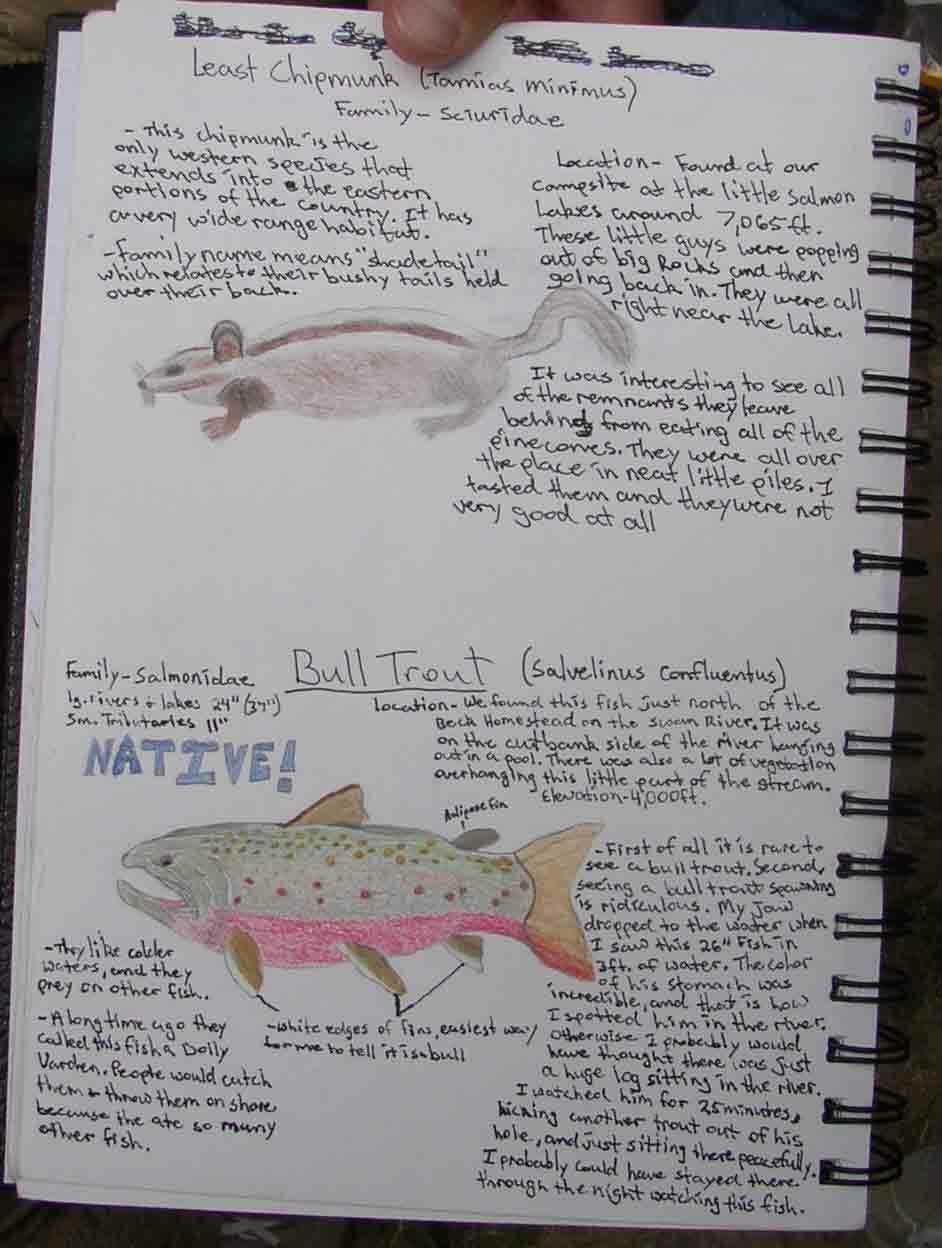 This field-based survey course covers the identification and distribution of common plants and animals in NW Montana. Students learn to recognize patterns on the landscape produced by combinations of geological forces, climate, fire, forestry, agriculture and human settlement. A significant portion of this course is taught while backpacking in the Swan Range and western Bob Marshall Wilderness.
This field-based survey course covers the identification and distribution of common plants and animals in NW Montana. Students learn to recognize patterns on the landscape produced by combinations of geological forces, climate, fire, forestry, agriculture and human settlement. A significant portion of this course is taught while backpacking in the Swan Range and western Bob Marshall Wilderness.
2. Watershed Dynamics, Forestry 395
3 credits, College of Forestry and Conservation
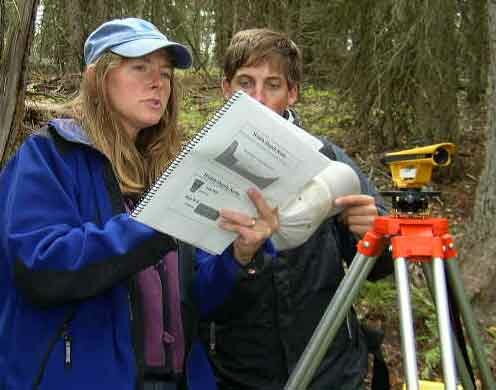 Students investigate watershed function, stream hydrology and morphology, fish habitat, and the impacts of road building and watershed fragmentation. Of particular interest is the relationship between forested watersheds and the rivers draining them. The course includes a tour of ongoing stream restoration projects along the Blackfoot River and its tributaries. Students conduct stream and wetland surveys as part of NwC's ongoing monitoring efforts.
Students investigate watershed function, stream hydrology and morphology, fish habitat, and the impacts of road building and watershed fragmentation. Of particular interest is the relationship between forested watersheds and the rivers draining them. The course includes a tour of ongoing stream restoration projects along the Blackfoot River and its tributaries. Students conduct stream and wetland surveys as part of NwC's ongoing monitoring efforts.
3. Forests and Rural Communities, Environmental Studies 395
3 credits, College of Arts and Sciences, Environmental Studies Department
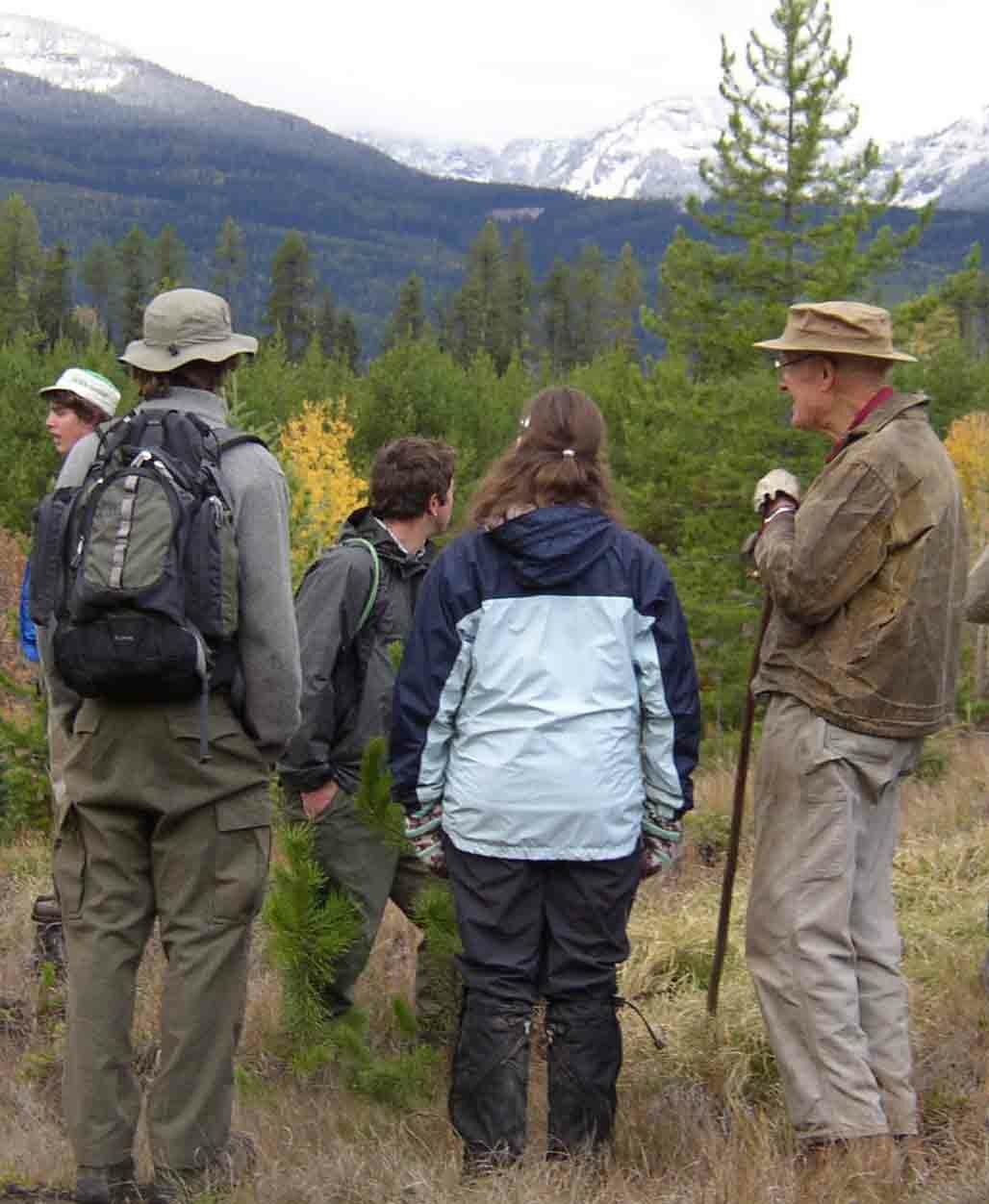 Students explore the complex relationship between forest ecosystems and human communities. Students investigate the ecology of local forests and trace the production of timber products from start to finish. They also help inventory forest stands in non-roaded areas for a local watershed analysis. During a two day homestay, students live with families in the Swan Valley; these experiences help inform discussion of the scientific and social aspects of sustainable forestry.
Students explore the complex relationship between forest ecosystems and human communities. Students investigate the ecology of local forests and trace the production of timber products from start to finish. They also help inventory forest stands in non-roaded areas for a local watershed analysis. During a two day homestay, students live with families in the Swan Valley; these experiences help inform discussion of the scientific and social aspects of sustainable forestry.
4. Independent Study, Environmental Studies 496
3 credits, College of Arts and Sciences, Environmental Studies Department.
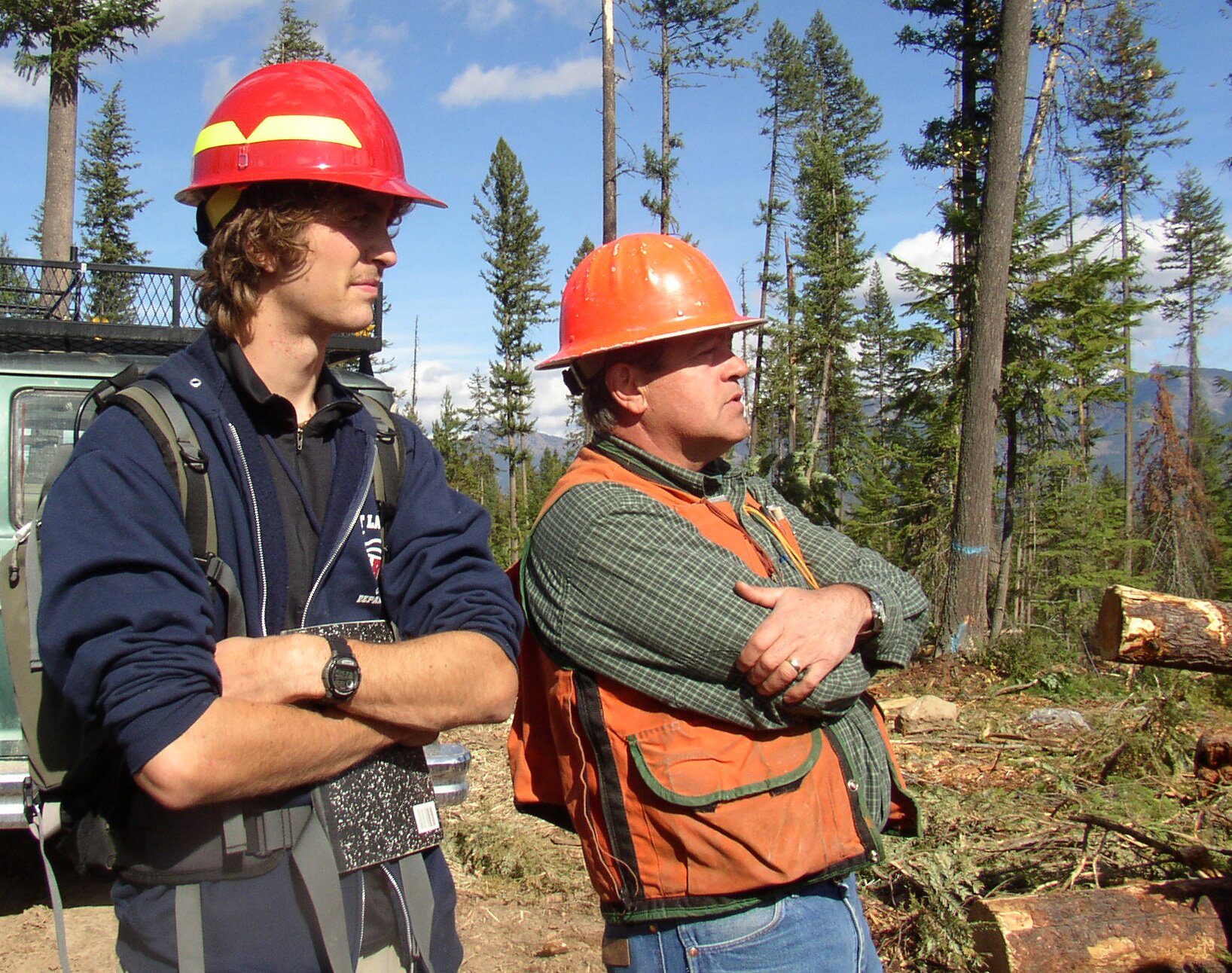 Students may either enter into an apprenticeship with a local mentor or complete a community project. Apprenticeships are available with loggers, wilderness rangers, forest service personnel, private foresters, log home builders and horse packers. Community projects in oral history, environmental education and wildlife monitoring are among those available. Students present their project at a community gathering on the final evening of the semester.
Students may either enter into an apprenticeship with a local mentor or complete a community project. Apprenticeships are available with loggers, wilderness rangers, forest service personnel, private foresters, log home builders and horse packers. Community projects in oral history, environmental education and wildlife monitoring are among those available. Students present their project at a community gathering on the final evening of the semester.
Examples of past Independent Study projects
5. Field Skills for Conservation Work, Recreation Management 395
3 credits, College of Forestry and Conservation
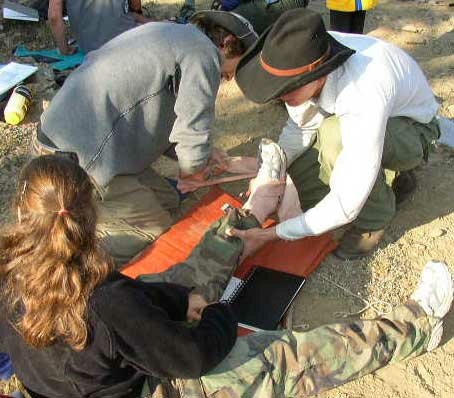 Students develop the competencies needed for field work. Students will become proficient in several major skill areas: field journals; wilderness first aid; navigation using map, compass and GPS equipment; protocol for surveying streams and amphibian populations; methods for surveying whitebark pine populations and stand exam techniques.
Students develop the competencies needed for field work. Students will become proficient in several major skill areas: field journals; wilderness first aid; navigation using map, compass and GPS equipment; protocol for surveying streams and amphibian populations; methods for surveying whitebark pine populations and stand exam techniques.
Instructors
Melanie Judge Parker is Northwest Connections Executive Director. She has an M.S. in Environmental Studies from the University of Montana and a B.S. in Environmental Studies from the University of California at Santa Cruz. She has taught ecology and environmental studies at the secondary and university level for 10 years. Her academic research addresses the ecological basis for including local communities in land resource management. Melanies primary interest is in bringing interdisciplinary knowledge to the task of solving environmental issues.
Andrea Stephens is Northwest Connectionís Education Program Director. She has an M.S. in Environmental Studies from the University of Montana and a B.S. in Natural Science from the University of Puget Sound. She is also a nationally registered Emergency Medical Technician. Andrea has taught ecology since 1986; she currently focuses on conservation service projects as a means of teaching field ecology. Academically, Andrea is interested in understanding both watershed function and disturbances that alter watershed behavior. Andrea coordinates the Field Semester as well as NwCs Wildlands Volunteer Corps for high school students.
Tom Parker is Northwest Connections Conservation Program Director. Tom has been a licensed guide and outfitter in the Swan Range for 25 years. Over the last seven years, he has worked as a wildlife researcher in both Yellowstone and Glacier National Parks, mainly studying mountain lions for the Hornocker Wildlife Research Institute. Tom has been working to integrate his knowledge of wildlife into land management for over fifteen years. He helped found Northwest Connections in part to help other working outdoorspeople become involved in conservation. Tom organizes and supervises NwCs long term ecological monitoring projects.
Steve Lamar is Northwest Connection's Program Manager. He has a B.S. in Outdoor Recreation from Murray State University. Steve has worked for the Forest Service for 17 seasons as a forestry technician and backcountry ranger. He has also worked as an outdoor instructor and guide for 12 seasons. Steve is also an accomplished rustic furniture craftsman. Steve has worked for Northwest Connections as an instructor and field assistant on grizzly bear DNA and whitebark pine research projects.
A variety of Swan Valley community members round out the instructional staff as speakers, hosts and guides. These individuals have earned their credentials in ecology through experience working on the land as hunters, trappers, outfitters and loggers.
back to top
FEES
$6900 - In State Tuition Rate (includes students currently
enrolled in any Montana university)
$8900 - Out-of-State Tuition Rate
Includes 15 semester credits from The University of Montana, room and board, NwC tuition, and all transportation during the field semester.
FINANCIAL AID
Students are responsible for determining if the financial aid package from their home institution will cover course costs for the Field Semester. University of Montana financial aid will generally cover Field Semester costs; however, all students should consult with their Financial Aid Office. Financial assistance may also be available through private foundations, federal grants and loans or AmeriCorps.
Can I transfer financial aid from my university to the Field Semester?
How can I apply for a Northwest Connections scholarship?
MEDICAL INSURANCE
All students must provide their own medical insurance while in residence at NwC.
DEADLINES, PAYMENT AND CANCELLATIONS
March 26 - Application and NwC Scholarship
Application DeadlineApril 23 - $900 non-refundable deposit due
June 6 - remainder of tuition due
$6000 - in-state students
$8000 - out-of-state students
Fees are payable by personal check or money order to Northwest Connections.
No refunds can be made for cancellations unless another student from our waiting list can fill your space. If we can fill your space a refund will be made less the registration deposit.
Northwest Connections cannot make exceptions to this cancellation policy for any reason, including, but not limited to, illness, travel delays, personal or family situations, emergencies, or weather. We urge you to investigate accident, baggage, and trip cancellation insurance with a travel agent. Travel insurance helps protect you against financial loss if you must cancel or interrupt a trip because of illness or injuries to yourself, a family member, or traveling companion.
NwC reserves the right to cancel the field semester due to insufficient enrollment. In the unlikely event of such a cancellation, NwC will notify students by April 2 and students shall be entitled to a full refund of all monies paid less the application fee. NwC is not responsible for financial loss due to non-refundable airline tickets or other such expenses.

back to top
Meskipun hanya dengan Slot Depo 5k, Anda tetap bisa menikmati fitur-fitur canggih yang biasanya tersedia di permainan dengan deposit lebih besar. Fitur seperti free spin, bonus jackpot, dan grafis berkualitas tinggi memastikan pengalaman bermain tetap maksimal meskipun dengan modal kecil.
RTP Slot Tertinggi Hari Ini memberikan kesempatan terbaik bagi pemain untuk menang. RTP slot gacor yang tinggi memastikan bahwa sebagian besar taruhan yang ditempatkan akan kembali ke pemain dalam bentuk kemenangan. Slot dengan RTP tertinggi selalu menjadi pilihan yang cerdas bagi mereka yang ingin meningkatkan peluang menang tanpa perlu mempertaruhkan modal besar.
Dalam Mahjong Ways 2, pemain dapat menikmati lebih banyak cara untuk menang berkat fitur-fitur baru yang dihadirkan. Slot ini dilengkapi dengan simbol-simbol khas Mahjong yang memberi kesempatan untuk memenangkan hadiah besar. Dengan RTP tinggi dan tampilan yang memukau, Mahjong Ways 2 menjadi pilihan utama bagi para pencinta game slot bertema Mahjong.
Bermain di dunia slot menawarkan pengalaman hiburan yang tidak ada duanya, terutama saat memilih situs yang menyediakan Slot Online. Dengan grafis yang menarik dan berbagai jenis tema permainan, slot online menjadi pilihan populer di kalangan pemain. Keuntungan bermain di platform slot online adalah kemudahan akses dan fleksibilitas waktu yang ditawarkan kepada para pemain. Jika Anda ingin merasakan sensasi kemenangan besar, slot online adalah tempat yang tepat untuk dicoba.
Banyak pemain slot online mencari pengalaman bermain yang adil dan menguntungkan. Toto Slot hadir sebagai pilihan utama dengan berbagai permainan menarik dan peluang menang tinggi. Selain itu, sistem keamanan yang canggih memastikan transaksi berjalan lancar dan aman, sehingga pemain bisa menikmati permainan tanpa khawatir akan risiko keamanan atau kecurangan.
Menjadi salah satu platform paling populer, Situs Toto menyajikan berbagai pilihan permainan togel dengan tingkat keamanan yang tinggi. Para pemain bisa merasa tenang saat melakukan transaksi atau taruhan di platform ini.
Keunggulan utama dari Slot777 adalah kemampuannya dalam memberikan hadiah besar dengan taruhan kecil. Banyak pemain telah membuktikan bahwa slot ini sering memberikan kemenangan besar berkat sistem fair play yang diterapkan. Jika Anda mencari permainan yang seru dan menguntungkan, game ini bisa menjadi pilihan tepat.
Banyak orang kini beralih ke sistem praktis seperti Depo 10k yang menawarkan cara bermain fleksibel dengan biaya rendah, cocok untuk hiburan sehari-hari.
Popularitas slot gacor Thailand terus meningkat karena reputasinya yang memberikan kemenangan lebih sering, memungkinkan pemain untuk mengoptimalkan strategi taruhan sambil tetap merasakan keseruan setiap putaran tanpa rasa cemas kehilangan peluang besar.
Bermain Toto Macau tidak hanya sekadar mengandalkan keberuntungan semata, tetapi juga strategi yang matang. Pemain berpengalaman sering kali memanfaatkan pola angka yang muncul dari hasil sebelumnya untuk meningkatkan peluang mereka. Dengan pemahaman mendalam terhadap pola dan sistem permainan, bettor dapat menghindari kesalahan umum dan memaksimalkan peluang menang di setiap taruhan.
Informasi asli dari Keluaran macau selalu dirujuk oleh pemain berpengalaman, sebab tanpa data resmi mereka tidak bisa memastikan validitas angka yang beredar di komunitas.
Para pemain yang serius sering hanya memilih Togel Resmi karena mereka ingin menghindari risiko penipuan dan memastikan setiap taruhan mereka dihitung dengan sistem yang terpercaya dan fair.